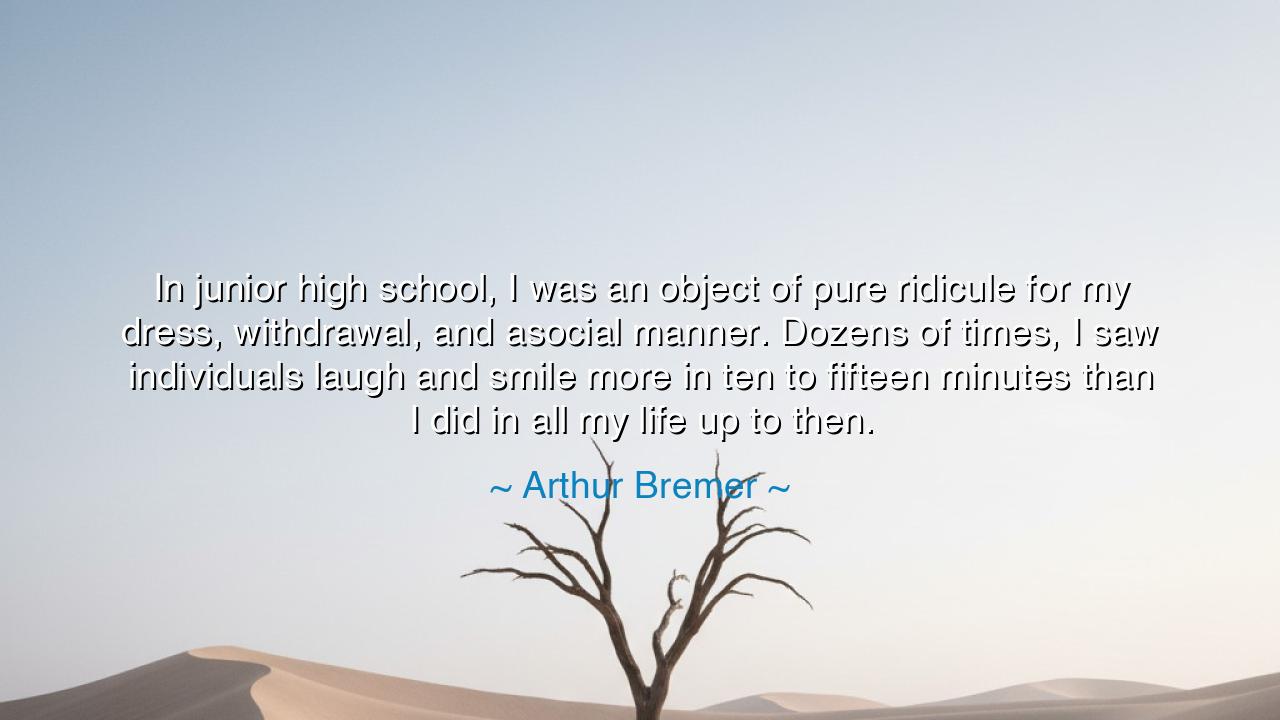
In junior high school, I was an object of pure ridicule for my
In junior high school, I was an object of pure ridicule for my dress, withdrawal, and asocial manner. Dozens of times, I saw individuals laugh and smile more in ten to fifteen minutes than I did in all my life up to then.






In the words of Arthur Bremer, we hear a confession carved from loneliness and pain: “In junior high school, I was an object of pure ridicule for my dress, withdrawal, and asocial manner. Dozens of times, I saw individuals laugh and smile more in ten to fifteen minutes than I did in all my life up to then.” Though stark, these words unveil a truth that many souls through the ages have endured—that ridicule cuts deepest not upon the skin but upon the heart, and that isolation can make the joy of others appear like a distant world, unreachable and strange.
To be an object of ridicule is to be made less than human in the eyes of one’s peers. Bremer’s story speaks of garments mocked, of silences misunderstood, of mannerisms scorned. Where others found fellowship, he found rejection. The laughter of his classmates did not sound as music to him, but as a reminder of all that he lacked. Their smiles, so easily summoned, became a cruel contrast to his own struggle to feel joy. In this contrast lies the tragedy of alienation: that what others take for granted becomes a mirror of one’s absence.
The ancients knew this pain well. In the writings of Euripides, outcasts and exiles lament not only their banishment from home but also from human warmth itself. To be excluded from the company of laughter was to be cut off from life itself, for joy was seen as the bond that held the polis together. Bremer’s lament echoes this truth: he stood on the edge of human fellowship, watching, while others lived in the center of it. His words are a cry from that outer darkness.
History offers many who began life as objects of scorn, yet turned pain into greatness. Abraham Lincoln, awkward in speech and dress as a boy, endured the barbs of peers. Yet in time, he transmuted ridicule into resilience and sorrow into compassion, becoming the leader who bore the grief of a divided nation. His story reveals what Bremer’s words lack: the possibility of redemption, of turning alienation into a deeper understanding of the human heart. The same laughter that once excluded can one day be guided toward unity by those who once stood outside it.
The wisdom hidden in Bremer’s words is this: the sight of others’ joy can wound the one who feels joyless. Yet it can also awaken the deepest hunger in the human soul—the hunger to belong, to connect, to smile not as a mask but as an honest expression of life. That hunger, if tended rightly, can be the seed of transformation. If left untended, it becomes bitterness and despair. The difference lies in whether the heart remains open or closes in upon itself.
For us who listen to these words today, the lesson is clear: never underestimate the power of a simple smile given freely, nor the cruelty of laughter turned into a weapon. Be mindful of those who sit apart, those who watch in silence, those who feel alien to the joy of others. A word of kindness, an invitation to join, a recognition of dignity—these small acts can turn the course of a life. Where ridicule isolates, compassion restores.
So, beloved, carry this teaching into your days: do not use your laughter to wound, but to welcome. Do not let your smile become a sign of exclusion, but of embrace. And if you have ever felt as Bremer felt, mocked and alone, let his words remind you that the laughter of others is not the measure of your worth. Seek instead to kindle joy within yourself and share it, however small, with others. For in the end, the truest victory is not to watch life from the margins, but to step into the circle of humanity with courage, carrying both the scars of your past and the hope of your future.






AAdministratorAdministrator
Welcome, honored guests. Please leave a comment, we will respond soon